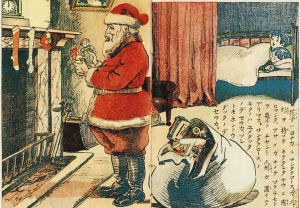I’ve had this blog post over at the Immanent Frame open for more than a week now trying to come up with something clever to blog about it, and I am struggling.
In it, Sarah Imhoff offers a fascinating discussion of the importance of belief in the Supreme Court’s understanding of religion.
One of the important parts of the test for if a religion should be accommodated is “sincere belief.” From the mostly-Protestant perspective that most Americans work out of, this seems pretty sensible – religion is mostly a matter of believing the right things, which might lead to practices or actions but is fundamentally something that happens in the heart and mind.
Imhoff offers some examples of times this might not be the case, like an Orthodox Jew for whom the rituals of the community remain important even though they’ve stopped believing in the theology. But, in honor of the season, I have come up with a better example: Santa.
We have a lot of (often very public) practices about Santa – his presence in malls and on the Macy’s float, cookies out by the fireplace, Christmas songs on every radio station saying that he’s watching, that bizarre Elf on a Shelf thing. But not-small-children tend to not believe in Santa.
So (calling Santa religious for the sake of carrying forward my festive example), suppose some law forbade Santa in public places and you felt that put a serious dent in your Christmas festivities. Going before the court, you would probably be out of luck – you don’t have a “sincere belief” in Santa, so there’s no burden that the court is required to justify or address.
You should read Imhoff’s piece, which is much more eloquent, but I wanted to throw out an example of how “belief” is a pretty incomplete way for the Court to treat religion.
